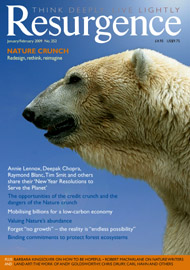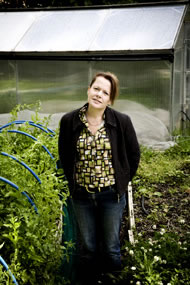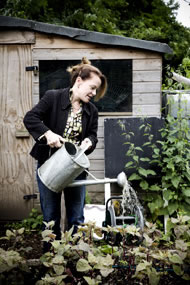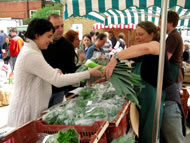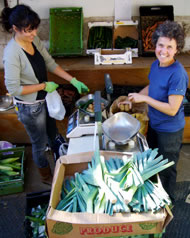JULIE BROWN’S BACKGROUND is in environmental campaigning – she was a Local Actions Co-ordinator for Friends of the Earth after she graduated from university – but by the early 1990s she had become increasingly interested in the ideals of social ecology. “I wanted to find a way I could embed myself in my community,” she says. “In particular, the possibility of setting up a community supported agriculture project which could procure food from those farms closest to my community in Camden leapt out at me as something positive and practical I could do.” In 1993, with two friends, she set up London’s first organic vegetable box scheme. The project eventually evolved into the ground-breaking initiative Growing Communities (GC), now based in Hackney, East London.
Growing Communities’ overall vision is to re-localise Hackney’s food supply, and to create a low-carbon model that can be replicated in other urban areas. The model is based around two community-led food-trading systems: an organic box scheme and an all-organic farmers’ market. The box scheme and the Stoke Newington Farmers’ Market harness the collective buying power of the community and direct it towards farmers who are producing food in a sustainable way, giving them a secure market and allowing them to thrive and diversify.
Included in this model, and intrinsic to the success of the scheme, are the three local market gardens that are leased from Hackney Council by the Growing Communities initiative and comprise the only Soil Association-certified land in London. Produce is grown by staff and volunteers and sold through the box scheme and farmers’ market. GC employs a part-time grower and an assistant grower on these market gardens, and has set up an ‘apprentice grower’ system whereby two volunteer apprentices are taken on for eight-month placements and trained in organic growing. It is hoped that some of these apprentices will go on to grow vegetables themselves for the GC box scheme on ‘micro-sites’: areas of land or gardens donated by members of the local community or the council. The aim is create a ‘patchwork farm’ across Hackney made up of market gardens and these micro-sites.
“The real beauty of GC is that it has created meaningful working alternatives to the current food system, with seventeen part-time jobs within the community,” says Julie. “One of the keys to making this whole project work is to enable those living in the city to create sustainable livelihoods for themselves – at the same time as enabling small-scale sustainable farmers to make a living in the countryside.” Growing Communities is self-financing – although it received some initial grants and funding. However, all the income needed to pay members of staff is now generated through the box scheme and farmers’ market.
THE BOX SCHEME has flourished since it was set up in 1993 with just 30 families supporting it – there are now nearly 500 households participating, and over 750 salad bags are packed per week. Likewise, the farmers’ market has grown from just six producers when it started in 2003, to over twenty producers a week now. It is estimated that between 1,500 and 2,000 people visit the farmers’ market every Saturday. Julie believes this shows that people in large cities and towns still value the provenance of their food and want to actively support small, local, organic growers.
The box scheme and farmers’ market are run according to a set of key principles that define GC’s holistic vision of a sustainable food system. Local people are members of the box scheme, customers at the farmers’ market, volunteers on the market gardens and workers at Growing Communities itself. In this way, people feel a deep connection to and ownership of the project. They get to know the people who grow their food and in many cases help to grow it, they help to pack and dispatch the food, and they cook and share it with their friends and family. The scheme itself fosters community.
The GC team also supports local people to make the move into sustainable food production themselves by providing them with stalls at the market and giving them advice on products and marketing: locals now sell Caribbean, Turkish and Indian foods made with seasonal organic ingredients bought from the market. The project enables those involved to feel part of a collective effort for change.
GC is actively working to find ways of replicating this model in other cities in the UK. Julie passionately believes that more communities around the country could be reclaiming their food systems from the supermarkets and agri-businesses by supporting others who are farming sustainably and on a small, humane scale. Schemes such as GC provide farmers and growers with a secure mechanism to earn a living. In the process these initiatives also provide many of their members with meaningful and joyful work.
AWARDS ARE A wonderful way of getting validation for your work – but they are also a means to an end. At a time when Julie has been actively promoting the Growing Communities’ model, she was nominated in the Women’s Social Leadership Awards, and was awarded ‘top leader of a social business’, an accolade that she hopes will give credence to her work and the model that she knows can be effective in any community.
“We stand at an unprecedented point in history where we can still rise to the huge challenges we face and create a world that is better in so many ways,” she says. “So much can be done to forge links and bring land into productive use. I’d love to see organisations like Growing Communities all around the country, reaching out to farmers and training people.” Julie urges local councils, public bodies and government to think about the real potential of urban growing and the needs involved. It is not just about making land available for urban growing – there is also a logistical need for premises, packing facilities and market space. But once the project is up and running, it is self-sustaining and grows to fit the needs of the community in many surprising ways. The micro-sites and apprentice grower systems, for example, were not envisaged in the original plan for GC, but evolved naturally as local people’s needs changed. Recently, GC helped a group of local residents to set up a community orchard that has become a hugely successful project in its own right.
On a personal level Julie needed to find out if her Growing Communities idea could make a contribution to creating a better world. Now that the Social Leadership Award recognises the value of her work, she feels that she is being the change she wishes to see in the world. •
For more information visit www.growingcommunities.org




